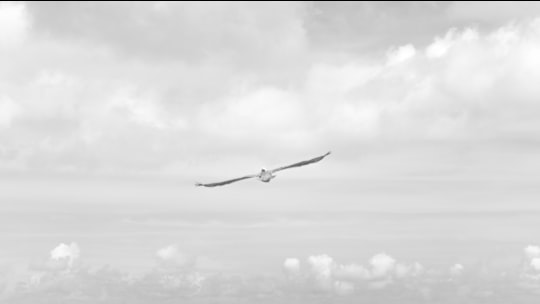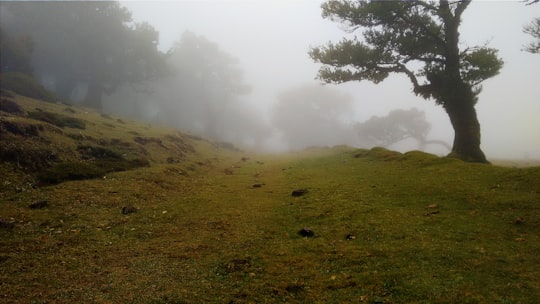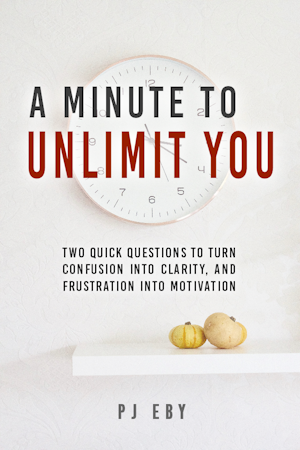I was originally planning to spend a little time this evening on writing a follow up to The Multiple Self, to expand on some points and answer some questions folks posed in the comments, but an interesting thing happened on the way to the computer, that I thought I’d share with you instead. (At least for now.)
Anyway, I was thinking about including a quote from an old book I’d read. I didn’t remember the title, but I knew the author had said something like “Use your faculties; don’t work yourself” in it, and I wanted to get the exact quote, and see what else he said that was relevant.
So I walked over to the bookshelves, and began systematically scanning them for the book using my usual technique of holding an image of the book in mind, so that it would “pop out” at me while I scanned.
About halfway down the first stack of shelves, it occurred to me that I was doing exactly what I just wrote that people shouldn’t do: attempting to cram a bunch of data through the narrow pipe of my consciousness. What I needed to do was to restate the problem in a way that would allow my subconscious to fully apply its processing power. And I thought of how in Psycho-Cybernetics, Dr. Maltz talks about the necessity of starting actions and allowing your subconscious (or “success mechanism” as he preferred to call it) to take over. So I decided to “just get the book”.
And then, without any thought whatsoever, I turned and walked a couple of shelves over and reached for the exact book I was looking for. I became consciously aware that I was doing this at about the time my fingertips were about four inches away from the book and my eyes were able to focus in on the title. “I” had literally found the book without even having seen it until it was almost in my hand.
That was more than a little spooky, but also exciting, like seeing a magician do a trick you just know can’t be done. How could “I” get the book like that when “I” didn’t know where it was? Obviously “I” didn’t know, but that didn’t mean the kernel didn’t have access to the information.
Truly, we don’t know what we can do until we try! The next time I need something and I don’t “know” where it is, I’m definitely going to just ask the kernel to get it for me.
If you want to try this trick yourself, I’d like to point out that it does require a certain initial rapport with your subconscious, or more precisely, it requires you to be able to suspend judgment in the way I described in the last post. You have to be able to act, even though you don’t know how you will act. If you’re busy listening to the radio in your head, you’ll forget to actually start walking to where the book (or other thing) is. You have to be able to stand back from the controls, and let your subconscious do the walking. This requires a certain amount of trust, but with a small experiment like this, what’s the worst that can happen? You might get creeped out a little when it works too well, and that’s about it.
So then, a little later this evening, at the grocery store, I had the feeling I was forgetting something, but wasn’t sure what it was exactly. So I “just walked to it” and found myself in front of the light bulbs that I’d consciously forgotten I needed.
It was still a little spooky, but I could definitely get used to this. I can hardly wait to find out what else “I” can do. 🙂







Impressive!
Is there any chance you can teach people how to do this in person and perhaps discuss further possibilities?
This post and the last one remind me a lot of Stephen Johnson’s ‘Mind Wide Open’, which I read recently.
The thing that he adds to your discussion is an appreciation of the different hormones that affect the two minds you perceive.
This is an article from Discover Magazine from years ago. I think you’ll like it. It was titled “The brain that misplaced it’s body” or something like that.
It’s about a type of stroke that causes paralysis but the victim is unaware of it. It illustrates the disconnect between the conscious and the rest of the brain.
The brain that misplaced its body
Haha, that’s brilliant. I’ve had similar experiences. Methinks the people who can throw many sixes in a row are those who are in tune with their subconscious 🙂
I get the impression that you’re not a religious person, but Romans chapter 7 goes into this whole thing.
I’ve read the past two articles, and as someone with a firm basic understanding of psychology, computer science, and philosophy, I am both impressed and intregued. Do you plan on making many more posts on this topic? If so, will they be in this blog or would you consider starting a new blog specifically for that purpose. Either way, let me know… you have my attention 🙂
I imagine this sort of suspending judgement would be really useful in sports, where the conscious mind does hindering than helping.
The Inner Game of Tennis goes into this idea pretty well, but I haven’t yet been able to implement it.
I would love to put together a collection of exercises that one could do to improve upon the “certain initial rapport with your subconscious” and how to “suspend judgment”.
Simple exercises like estimating the value of 127 * 45, or a way to say “Hello” to your subconscious. I guess these would be mind hack exercises
Guess the subconscious can do it all!
One evening I was pick-pocketed in town and I didn’t even have money to take a cab. I bent down in the dark to “picked my fare”. And there it was – Just enough to get me home!
Springing off Drew’s comment, I’d suggest that, while Romans 7 does draw a divide between the “flesh” (NASB) and the spiritual self, it’s in the context of {old, sin-controlled self} vs. the {new, spirit-controlled self} that one gets after becoming a Christian (which, AFAIK, Phillip doesn’t claim to be). The author of Romans complains of his vexing inability to suppress his sinful urges depite his conscious desire to.
Finding books on a shelf probably doesn’t involve a struggle between sinful and spiritual motivations; Phillip’s just talking about conscious vs. unconscious—levels of awareness—which everyone, regardless of faith, seems to have.
Shows you how much I know; I thought he was alluding to such biblical notions as taking no thought for the morrow, and not worrying about what you’re going to say because the spirit will speak in you when the time comes. Those are certainly more relevant to this particular post. 🙂
This comment has been removed by a blog administrator.
Or as Yoda put it, there is no try. Do, or do not.
“The brain that misplaced it’s body” – Not only in the paralysis does something like this happen.
While I can’t easily find a link to a paper on the subject, a phenomenon known as spatial neglect happens to some people that have a stroke in or near the are connected to the visual cortex.
This causes a very unusual thing to happen. The brain no longer “sees” a whole half of the visual field.
But in experiments using prism glasses that “shift” the visual field to one side, in essense compensating for the neglected area, the could access it again.
Thier vision is unaffected, but they literally have no “conscious” method to access it that area at all!
I’ve been thinking about ways of altering some pretty fundamental personality traits. It’s incredibly difficult, but I think you’ve given me some new ways of thinking about the problem. This has been really interesting.
I have used this technique when programming. Sometimes, I just let the code flow and I don’t question why I wrote it – especially when it works.
Photo of your Self
Ah yes. “Self-induced schitzophrenia.” Great articles! I’ll link to you.
Or Zen tennis? Where you get yourself out of the way, and a Thing from inside your brain plays the game? But supposedly this isn’t any fun, since you can’t take credit for the amazing score.
I too have done the book-finding trick. I was sorting my whole book collection into boxes as fast as humanly possible… then found that I wasn’t looking at them, I was just grabbing all the ones of a particular subject and dropping them into a box. Then I was turning around and grabbing them from bookshelves behind me at random, and grabbing the right ones. Then I could approach a shelf and know that there was one book of that particular subject buried backwards in a pile. I later looked over those boxes and found that maybe one out of fifteen or twenty was wrong… so it’s not 100% reliable. But it sure saves time when you have to pack huge piles of books in a hurry.
Here’s a bit from contemporary psychology, Kohlenberg/Tsai’s “Self” theory
Try the “unSELF-ishness” writing trick listed on Childhood Brain Mods When it works, it’s almost frightening.
Also see my article on nerd mind hacks about dealing with shyness by recognizing your multiple nature, On Shyness
Can ya bend spoons too? If so, you have the makings of a great sideshow. Call it, Uncle Bunk’s Amazing Show of The Amazing.
After reading this post and the last, I’m pretty sure that the stuff about “intending” at The Field Center will resonate with you.
The phenomenon you described is essentially a commanded form of “Once you stop paying attention to it you’ll figure it out.”
It would be interesting to consider the link between the the idea of “sleeping on it” and the points you bring up in these articles.
that’s awesome, i hope i can get “myself” to do that as well
maybe i have done it in the past when i couldnt remember my PIN at the ATM, but i could just type it with my fingers.
or is that just force of habit?
What if instead of your “subconscious” being the supposed one at the helm, it is actually a being with its own unique set of thoughts and intentions that is taking time to direct your individual actions?
What if instead of your “subconscious” being the supposed one at the helm, it is actually a being with its own unique set of thoughts and intentions that is taking time to direct your individual actions? The non-acknowledgement of the possibility of behavior manipulation is an assumption all of its own ;~)
Hey I believe you!
There was this time when I chose a password by the ‘kernel’ of my brain and every time i needed to login, i just let the fingers flow and type it out. At no point of time, did I ever think of the actual password…
Hi P.J.,
You wrote, "If you want to try this trick yourself, I'd like to point out that it does require a certain initial rapport with your subconscious…"
I wonder if the difficulty with having rapport with our unconscious is because of all the "bad feelings" most folks have accumulated over the years because of being treated badly by others…especially during one's youth, and then not doing something positive with those bad feelings. Something positive like forgiving all those folks for what they have done to us…incident by incident.
I mention forgiveness as a strategy because it isn't likely we will receive apologies from those folks that have abused us.
Receiving no apologies and not forgiving others is that place "between a rock and a hard spot" because we intrinsically feel that we have worth.
I suspect it is difficult for most to want to develop rapport with their subconscious because of all the hurt feelings lurking inside.
Just a thought.
I remember years ago my Dad telling me how when he had a math problem to solve, he quickly or even instantaneously KNEW the answer with little or no conscious effort, and in little or no time. Yet his "conscious" mind needed to go through the process of figuring out the equation, just to make sure!!! And the pre-concious answer was usually right. He commented on how trusting the initial answer was not easy.
I've had more than my share of experiences where the sub or un-concious mind did it's job, and I got to notice that a few moments later. Sometimes, it was literally a life or death situation. And if I had to wait for the conscious mind to decide what to do, it would have been all over. I'd be dead. (I raced motocross in my early teens and was an ironworker up on the 6 inch or so wide steel beams, often inches away from falling or being knocked off the steel, be it one or many stories high.)
Similarly, I've had, for example, Clients (I'm now a yoga/bodywork muscle therapist) who are world-class musicians with whom I've discussed the fact that while the conscious mind — awareness — must stay observant yet as silent as possible (no mind chatter or "automatic talking" going on) to perform well. The conscious mind is there to monitor the behavior of the sub/un-conscious mind, just in case something out of the ordinary needs slight or gross modification.
So the sub/un-conscious seems to work best in routine matters where nothing much is all that different. And like driving a car, slight deviations from the norm can be handled by the sub/un-conscious mind. But too much deviation from the norm requires the conscious mind to open channels allowing unique, creative modifications from historically routine patterns to occur when necessary.
That, in some ways, seems to be the gap in which we seem to be separated from the animal world: instinctual, conditioned REACTIONS versus unique, creative RESPONSES.
An interesting area to observe, research, and become more clear on.
My whole memory works like this, I don't think about what the answer might be, I just trust my brain to have it, and it almost always does.
I never take notes when I'm being taught something, whether it's work, school, or wherever else, and yet I consistently get over 90% on tests, etc.
…this is probably why I suck at researching things.